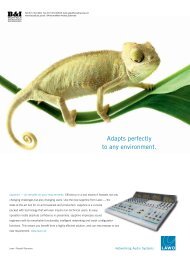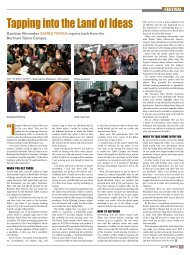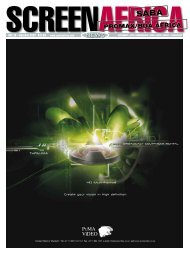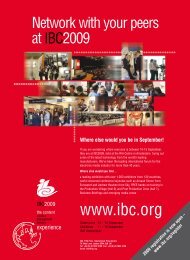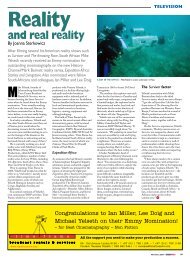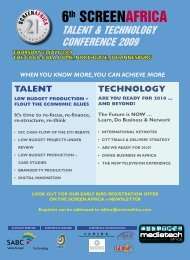Dowbload Part 3 - size: 2.7mb - Screen Africa
Dowbload Part 3 - size: 2.7mb - Screen Africa
Dowbload Part 3 - size: 2.7mb - Screen Africa
You also want an ePaper? Increase the reach of your titles
YUMPU automatically turns print PDFs into web optimized ePapers that Google loves.
CONTINUED FROM PAGE 1<br />
Piracy hits District 9<br />
“Consequently, all the English subtitles in the film are obscured<br />
by Russian subtitles.”<br />
The camcording was traced by the international organisation,<br />
the Motion Picture Association (MPA), of which SAFACT is a<br />
member. Says Lennox: “The MPA has dedicated resources for<br />
analysing camcordings. There are always watermarks on any<br />
original pirate version. Just by way of comparison, in the case of<br />
X-Men Origins: Wolverine, the piracy was due to a studio leak and<br />
not a camcording.”<br />
In Johannesburg pirates keep popping up in the same places<br />
despite the fact that SAFACT always moves them on. The<br />
Johannesburg Metropolitan Police Department (JMPD) is,<br />
according to Lennox, doing a great job in assisting the fight<br />
against piracy.<br />
“The real challenge is to stop camcorders in cinemas,”<br />
comments Lennox. “Our low tech solution would be to have<br />
cinema staff walking up and down the aisle looking for<br />
camcorders. That’s what we did with Mr Bones 2 and it was very<br />
effective. The film wasn’t pirated until the second day of DVD<br />
release.”<br />
SAFACT believes that it is vital that anyone involved in the<br />
making of a feature film be sensitised to piracy. “Filmmakers and<br />
their crews need to be committed to avoiding piracy and must<br />
manage the risk. So we would advise no distribution on screeners<br />
and having the film on 35mm for all screenings, even<br />
classification screenings. No digital copies should be sent to film<br />
festivals and the master must be protected at all times. If anyone is<br />
making a film they are welcome to give us a call and we can<br />
advise them on anti-piracy measures that won’t impact on the<br />
budget,” concludes Lennox.<br />
The organisation receives between 50 and 60 tip-offs a month<br />
on Crime Line (ie. 32211), via faxes and through its website<br />
(www.safact.co.za).<br />
Refinery – business as usual<br />
Charl van der Merwe<br />
are going into our busiest<br />
trading period for the year and<br />
we have seen a slow upturn,<br />
but an upturn nevertheless for<br />
the next two months at least.<br />
“We as management believe<br />
in this business, and we made a<br />
decision that if there is one<br />
party who really understands<br />
this business, and knows the<br />
risks, it is the management.<br />
Hence the reason for our<br />
negotiations and discussion<br />
with the current owners of the<br />
Refinery.”<br />
Van der Merwe said it was<br />
important for the industry to<br />
understand that the Refinery<br />
Kenya/SA sci-fi film collaboration<br />
of my heart. Her interpretation of Asha and the story was<br />
painfully tender and through it new, undiscovered layers of the<br />
film came alive.”<br />
She explains the origins of the film’s idea: “The film was<br />
inspired by a conversation I had with a friend about living in a<br />
world where we bought bottled air, only to find out that oxygen<br />
bars have been created and exist in some places in the world.”<br />
On the film’s message she said, “Pumzi is about a world in the<br />
future where there is no water. Some have called it an<br />
environmental short film, others sci-fi. I think it is a cautionary<br />
tale about where we are headed. When I got back to Kenya after<br />
directing Pumzi, I found that the drought in Kenya has made<br />
Pumzi a more tangible reality than is comfortable.<br />
She added, “Creating a futuristic <strong>Africa</strong> lends itself to a touch of<br />
sci-fi. The main character is also a scientist of sorts; she works as a<br />
curator at the Natural Virtual History Museum. She runs tests<br />
and experiments that create life where she thought there was<br />
none.<br />
“Sci-fi is definitely not a first in <strong>Africa</strong>, although it is not a genre<br />
used often. More than the genre, I am confident in the story of<br />
the film. The journey of Asha as she discovers life; the rebellion<br />
of Asha when she chooses to follow what she has discovered. I am<br />
confident that the story has heart, softness and courage. That is<br />
what appeals to me more than the way it is made.”<br />
Pumzi was shot in Cape Town in what the writer/director<br />
described as “some of the most scenic and beautiful locations”. She<br />
said that the internal shots were primarily shot at The Good<br />
Hope Centre while the exteriors were shot in the Atlantis dunes,<br />
the producer’s swimming pool and a parking garage.<br />
Kahiu’s passion for film started at 16 when she began to intern in<br />
entertainment companies in Kenya and internationally. This<br />
included working as a production intern at Pinewood Studios,<br />
London; a production assistant in Alexandria Productions,<br />
Virginia; and as a director’s intern at Paramount Studios,<br />
Hollywood, during the production of Italian Job directed by F<br />
Gary Gray.<br />
After attending UCLA’s Master programme in film directing,<br />
Kahiu’s professional debut was directing a behind-the-scenes<br />
documentary, The Spark that Unites (2006) for the film Catch-A-<br />
Fire (Universal Films/ Working Title) directed by Phillip Noyce.<br />
Kahiu honed her filmmaking skills with her first Kenyan film<br />
Ras Star (2007), a short film based on a teenage artist trying to<br />
make it into a talent show despite all odds. The film was<br />
produced for M-Net.<br />
In 2008, Kahiu completed her first feature film, From a<br />
Whisper, based on the real life events surrounding the 7 August,<br />
twin bombings of US Embassies in Nairobi and Dar es Salaam in<br />
1998. The film recently won awards at Nigeria’s <strong>Africa</strong> Movie<br />
Academy Awards including Best Director and Best Picture. It<br />
also won the Golden Dhow award for Best East <strong>Africa</strong>n Picture<br />
at Zanzibar International Film Festival 2009 and is still doing the<br />
festival route internationally. M-Net has again commissioned<br />
Wanuri to direct a documentary, this time about the life of Nobel<br />
peace Prize laureate Wangari Maathai, entitled For Our Land<br />
(2009) as part of the flagship series The Great <strong>Africa</strong>ns.<br />
and Waterfront Studios are<br />
completely separate entities<br />
and the Refinery management<br />
was only concerned with<br />
extricating the Refinery from<br />
MFP Holdings.<br />
“It is unfortunate that there<br />
has been such a long delay in<br />
making an announcement<br />
regarding the future of the<br />
Refinery, as this may have<br />
created a negative perception of<br />
exactly what is transpiring,”<br />
said Van der Merwe.<br />
“Furthermore, it’s important<br />
for the industry to understand<br />
that as management, we were<br />
neither directors nor<br />
shareholders of the Refinery,<br />
and in keeping with good<br />
corporate governance we could<br />
therefore not disclose<br />
information of a sensitive<br />
nature.<br />
“Unfortunately this<br />
conundrum did not work in<br />
our favour and has no doubt<br />
caused harm to the reputation<br />
of the Refinery. On the<br />
positive side however and in<br />
terms of the legal structure and<br />
ownership we should be able to<br />
make an announcement within<br />
the next week or so. But<br />
for now it is business as<br />
usual.”<br />
Int’l drama<br />
films in JHB<br />
London based<br />
production company,<br />
is working locally with<br />
Out of <strong>Africa</strong><br />
Entertainment.<br />
Strike Back, which is<br />
a 6 x 60-minute drama<br />
series, is a story of<br />
deception, redemption<br />
and revenge, all played<br />
out in the interlinked<br />
lives of two former<br />
soldiers; Major Hugh<br />
Collinson and<br />
discharged veteran<br />
John Porter. Their<br />
paths last crossed<br />
seven years ago. Now,<br />
amidst a new hostage<br />
crisis in the Middle<br />
East, their lives are<br />
about to collide again.<br />
Shooting format is<br />
35mm, processing is at<br />
The Film Lab, and<br />
the dailies transfers<br />
are at The Refinery.<br />
Stock and equipment<br />
is from Media Film<br />
Service.<br />
DOP is Steve<br />
Lawes and the A<br />
camera operator is<br />
local boy Harmon<br />
Cusack, who is<br />
enthusiastic about<br />
shooting 35mm for a<br />
drama series. “Film is<br />
still the best capture<br />
medium. Its large<br />
exposure range is<br />
unbeatable,” he says.<br />
“On Strike Back we are<br />
using two 35mm 3<br />
perf. cameras most of<br />
the time. Our format<br />
is 16:9 and using the 3<br />
perf. we are able to get<br />
25% more value out of<br />
our stock.<br />
“Originally this<br />
production was going<br />
to be shot on HD,”<br />
concludes Cusack.<br />
“But with the<br />
challenges associated<br />
with this shoot, 35mm<br />
was the preferred<br />
choice. Steve Lawes,<br />
our DOP, agrees that<br />
HD would have been<br />
difficult given the<br />
logistics of this<br />
production.”<br />
The series is due for<br />
flighting in early<br />
2010.<br />
October 2009 – SCREENAFRICA<br />
47



